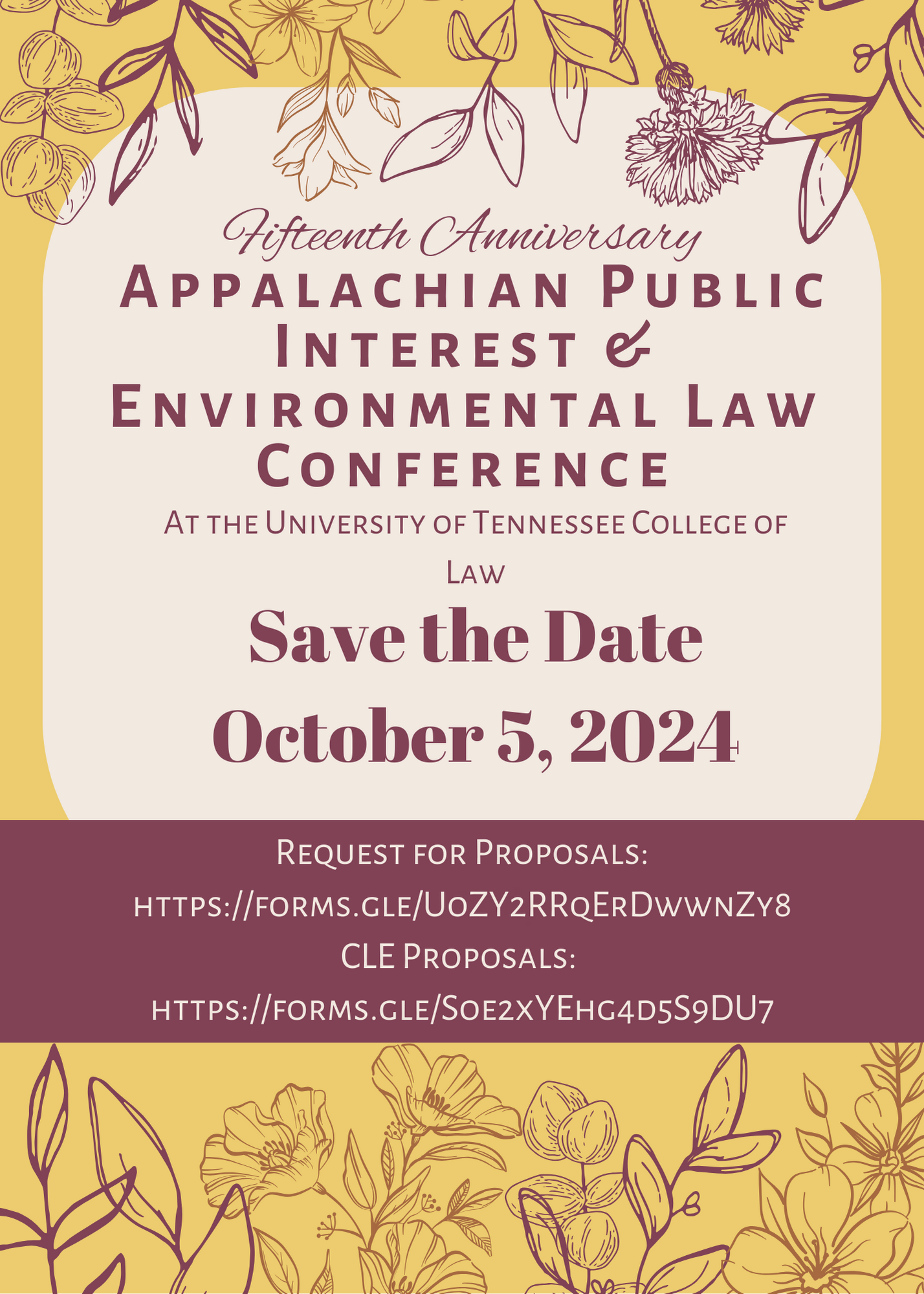
10 Reduced Inequalities (38)
Reduce inequality within and among countries
Join policy makers, experts and lawyers to discuss Southern Appalachian enviro and legal issues

KNOXVILLE — The 15th Appalachian Public Interest and Environmental Law Conference (APIEL) is set for Oct. 5 at The University of Tennessee College of Law.
APIEL is an annual gathering of lawyers, scientists, students, and members of the general public to discuss environmental issues and happenings in Appalachia, public policy, and grassroots initiatives.
The purpose is to create dialogue between lawyers, activists, and scientists on the local areas of need and foster engagement within the community to be forces of change in the legal realm.
APIEL is a conference of the student-run Environmental Law Organization (ELO) at the University of Tennessee College of Law. ELO is not directly affiliated with the University of Tennesse or any particular non-profit organization. It is dedicated to providing students and attorneys with learning opportunities and leadership experiences.
Celebrate Black Appalachian roots at spring fish fry

WHITESBURG — Join Black in Appalachia supporters and friends for a fish fry, live music and fellowship at its field office in Whitesburg, Tenn.
The homecoming is set for 1-8 p.m. April 20 at 8004 Andrew Johnson Highway.
The first Black in Appalachia Homecoming is meant to celebrate friends, families and coworkers near and far on the commemoration of setting roots in East Tennessee.
Black in Appalachia is a nonprofit that works with media, residents, universities, libraries, archives and community organizations to highlight the history and contributions of African-Americans to the development of the Mountain South and its culture.
John Nolt still examines the incomparable value of nature
Written by JJ Stambaugh Former University of Tennessee Professor John Nolt strolls through his garden during a recent conversation about his career as a philosopher and one of the Southern Appalachian region’s most respected environmental activists. J.J. Stambaugh/Hellbender Press
Former University of Tennessee Professor John Nolt strolls through his garden during a recent conversation about his career as a philosopher and one of the Southern Appalachian region’s most respected environmental activists. J.J. Stambaugh/Hellbender Press
Former UTK prof defends the environment, logically
KNOXVILLE — It’s hard to think of many figures in the local environmental movement who command the respect that former University of Tennessee Professor John Nolt has earned over the past four decades.
He has served as a leader, a teacher, and a repository of wisdom for thousands of students and activists. He’s authored eight books on environmental ethics and logic, and he was one of the main players in the struggle to force a cleanup of the notorious David Witherspoon Inc. site in South Knoxville.
While the 73-year-old philosopher’s formal academic career came to an end a couple of years ago, I feel privileged to report that he’s continued to add to his legacy. You see, it’s come to my attention that quite a few people are curious to know what he’s up to these days, and Hellbender Press agreed that I should chat him up.
Southeast highlighted in latest national climate assessment
Written by Southern Environmental Law Center The Tennessee Valley states (TN, AL, MS) are among the most irresponsible in their languid pondering about climate change mitigation. Illustration from the 5th National Climate Assessment
The Tennessee Valley states (TN, AL, MS) are among the most irresponsible in their languid pondering about climate change mitigation. Illustration from the 5th National Climate Assessment
Urgent investments in local solutions are needed now more than ever as climate impacts grow across the South
The 5th National Climate Assessment, released this week by the U.S. Government, reports on the current climate trends, impacts and solutions across the country. It underscores the urgency and opportunities for meaningful climate action.
This year, it includes a chapter highlighting how climate is impacting our Southeastern landscape and communities, plus what trends we can expect in the years ahead.
The report substantiates what we’ve been witnessing on the ground: Extreme heatwaves are already more common, sea level rise is encroaching into coastal communities and throughout the region, we’re seeing more flooding from increasingly unpredictable, volatile storms. According to the report, the country now sees a billion-dollar weather disaster every three weeks on average. In the 1980s, that average was every four months.
- 5th national climate assessment
- southern environmental law center
- alys campaigne
- national climate assessment
- climate change mitigation
- sea level rise
- climate emergency
- resilience
- climate leadership
- south carolina strategic statewide resilience and risk reduction plan
- climate hazard
- climate disaster
- black and brown community
- lowincome community
- vulnerable community
Intergenerational Playspace open in North Knox

Legacy Parks Foundation cut the ribbon on the Intergenerational Playspace at Beverly Park in North Knox County. It is the first park in the region to be purposefully designed to create active interactions between multiple generations, especially children and seniors.
“This park was made possible by our many partners that supported and funded the project,” said Carol Evans, Legacy Parks’ executive director.
Legacy Parks was awarded a $150,000 two-phase grant from the Trinity Health Foundation to research, design and create the Playspace. Additional grants and construction services provided by Knox County made the park possible
‘Save Money, Save Energy’ Expo — at Ijams this Sunday
 Explore how to reduce your monthly power bill and increase the health and comfort of your home.
Explore how to reduce your monthly power bill and increase the health and comfort of your home.
Federal and local funding opportunities available at all income levels
KNOXVILLE — As the weather turns colder, many Knoxvillians start to worry about home heating bills. Fortunately, energy efficiency incentives and funding programs are available to Knoxvillians of all income levels through federal tax credits and rebates. Free local funding is available for qualifying customers of KUB through the “Home Uplift” program. Many Knoxvillians are unaware of these opportunities or unsure of how to access the funding programs.
Family-friendly Home Energy Expo
The local organizations that cooperate with small local businesses in the Save Money, Save Energy program and the expo and workshop at Ijams are the Southern Alliance for Clean Energy (SACE), Knoxville Utilities Board (KUB), Socially Equal Energy Efficient Development (SEEED), Sierra Club – Harvey Broome Group, Three3 (pronounced three cube) and Tennessee Interfaith Power and Light (TIPL).
Home Energy Expo at Ijams Nature Center, 2915 Island Home Ave, Knoxville, TN 37920 — Sunday, Nov. 5, 2023 from 1 p.m. to 4 p.m.
Save Money, Save Energy workshop starts at 2:30 p.m. (RSVP recommended to secure a seat)
Arbor Day Bonus: $4.3 mil in FED grants means more Knoxville trees
Please join Mayor Kincannon, City Council members, Trees Knoxville and University of Tennessee leaders, and others at the City Tree Board’s Arbor Day tree-planting at 2 p.m. Monday, Nov. 6, at Harriet Tubman Park, 300 Harriet Tubman St.
Thanks to two federal grants totaling $4.3 million, tree lovers hoping to expand Knoxville’s canopy — especially in neighborhoods needing it the most — are especially joyful this Arbor Day.
The federal government has awarded $1.7 million to Trees Knoxville, a City nonprofit partner, to plant and maintain 7,500 trees along streets, in parks, at schools, in public housing communities, in historic African-American cemeteries and elsewhere.
The University of Tennessee, Knoxville, was awarded another $2.6 million to increase tree canopy coverage, reduce stormwater runoff, mitigate extreme heat and bring ecosystem services to underserved communities in East Knoxville.
Both tree grants were funded through the federal Inflation Reduction Act, touted as the biggest climate investment in U.S. history.
“The investments made possible by these federal grants will be transformative,” Mayor Indya Kincannon said. “We’re going to reverse the slow decline of tree canopy, and in fact prioritizing the greening up of areas that we know are the most in need of additional plantings.”
Solar for All: An opportunity to expand alternative-energy access
Written by Southern Environmental Law Center The historic federal climate legislation known as the Inflation Reduction Act passed last summer. The $7 billion program will help fund rooftop solar projects benefiting communities with lower incomes and provide workforce development enabling millions of households’ access to affordable, resilient, and clean solar energy. Southern Environmental Law Center
The historic federal climate legislation known as the Inflation Reduction Act passed last summer. The $7 billion program will help fund rooftop solar projects benefiting communities with lower incomes and provide workforce development enabling millions of households’ access to affordable, resilient, and clean solar energy. Southern Environmental Law Center
A competitive grant program to bring solar power to people with limited incomes has found huge demand in the South
CHARLOTTESVILLE — Alabama, Georgia, North Carolina, South Carolina, Tennessee and Virginia, as well as other tribal governments, municipalities and nonprofits submitted applications for Solar for All, a new program designed to expand solar access.
Part of the historic federal climate legislation, the Inflation Reduction Act passed last summer, the $7 billion program will fund rooftop solar projects benefiting communities with lower incomes and provide workforce development enabling millions of households’ access to affordable, resilient and clean solar energy and related jobs. These funds have the potential to double the number of rooftop solar customers with 100 percent of cost saving solar, benefiting customers that would not otherwise be able to access solar.
“This is a generational opportunity to enable low-income households in the South to access affordable, resilient, and clean solar energy,” Thompson said.
APIEL 2023, Oct. 21 — the 14th Appalachian Public Interest and Environmental Law Conference
 ELO is a student-run organization at the University of Tennessee College of Law. It is not directly affiliated with the University of Tennesse or any particular non-profit organization. It is dedicated to providing students and attorneys with learning opportunities and leadership experiences.
ELO is a student-run organization at the University of Tennessee College of Law. It is not directly affiliated with the University of Tennesse or any particular non-profit organization. It is dedicated to providing students and attorneys with learning opportunities and leadership experiences.
Networking environmental leaders across Appalachia and the State of Tennessee
Knoxville — APIEL is a relative newcomer to the small circle of inclusive U.S. public interest environmental law conferences. Because it is organized by law school student volunteers, APIEL is affordable to attend for citizens from all walks of life. Students are free!
APIEL is much loved and considered essential by regional nonprofit leaders and activists. It is also highly acclaimed by seasoned environmental lawyers. With just 13 conferences under its belt, APIEL has risen to rank among leading peer conferences with a much longer track record, such as the Public Interest Environmental Law Conference (PIELC) at the University of Oregon School of Law (41 events), the Red Clay Conference at the University of Georgia School of Law (35) and the Public Interest Environmental Conference (PIEC) at the University of Florida’s Levin College of Law (29).
Juneteenth: An Urgent Call for Climate Solutions
Written by EarthSolidarity!™  ExxonMobil’s Baton Rouge, LA refinery, Feb. 11, 2016. Later that day, shortly before midnight, a massive fire broke out, bathing the night sky in an orange glow visible for miles around.
ExxonMobil’s Baton Rouge, LA refinery, Feb. 11, 2016. Later that day, shortly before midnight, a massive fire broke out, bathing the night sky in an orange glow visible for miles around. ![]() Jim Brown/Flickr
Jim Brown/Flickr
Generations of Black Americans have faced racism, redlining and environmental injustices, such as breathing 40 percent dirtier air and being twice as likely as white Americans to be hospitalized or die from climate-related health problems.
AMERICA TODAY — This week, NPR’s Living on Earth podcast and illustrated transcript elucidates how relevant the broader meaning and historic context of Juneteenth is for all American citizens and residents.
Host Steve Curwood discusses with Heather McTeer Toney her new book, ‘Before the Streetlights Come On: Black America’s Urgent Call for Climate Solution.’
McTeer served as the Southeast Regional Administrator of the Environmental Protection Agency in the Obama administration and is now Executive Director of Beyond Petrochemicals. She argues that the quest for racial justice must include addressing the climate emergency and that the insights of people who experienced the negative health and socio-economic impacts of the petrochemical industry must be tapped to develop solutions that will work on the ground.
- juneteenth
- environmental justice
- racial justice
- heather mcteer toney
- social justice
- racism
- air pollution
- petrochemical
- petrochemical industry
- living on earth
- npr podcast
- slavery
- history of slavery
- climate emergency
- cancer alley
- steve curwood
- public health
- environmental racism
- mississipi river
- baton rouge
- black vote
- black and brown people
- interfaith power and light
- evangelical on the right
- religious leadership
- evangelicals for the environment
More...
KUB and SACE provide a guide to a home efficiency uplift
KNOXVILLE — Are you looking to take control of your utility bills to not only save money but also breathe easier knowing your home is healthier and more comfortable? Join us this Wednesday, May 17, from 6-8 PM for a free workshop to learn about newly available, once-in-a-generation funding, resources, and rebates that everyone can benefit from, regardless of if you own or rent your home, or if you have high or low income, through local and federal funds.
KUB is providing free (yes, free) home energy improvements for income-eligible customers through the Home Uplift program. New or repaired HVAC units, attic and wall insulation, appliances, and electric water heaters are just a few of the home energy upgrades that you may receive. Plus, professional crews are ready and waiting to do the work so you don’t have to.
— Southern Alliance for Clean Energy
Maryville College professor’s podcast highlights how the present is weirder than the past
Written by Robert Norris
“Historical research brings all kinds of insight into who we are in the present day as a species.”
MARYVILLE — Ever wonder how human society and culture blossomed into what it is today?
In his new podcast, “You Are a Weirdo,” historian and Maryville College professor Doug Sofer aims to help people learn just how far we’ve come as a species by embracing how the “strangeness” of the present day would be considered even more vastly weird by the historical standards of the past.
“Real history is a process of interpretation — of understanding the past based on evidence” Sofer said. “Good history is equally immersive; it gets you out of your skin.”
So far, Sofer has immersed his audience in interpreting and understanding topics ranging from why tea is considered a distinctly British beverage, despite being grown in Asia, to why jokes have a short shelf life depending on the decade they are told.
Regardless of each episode’s topic, Sofer finds history to be “the study of human possibilities.” Sofer wants people to learn “that real, legit historical research brings all kinds of insight into who we are in the present day as a species.”
8 billion people and counting in the face of climate change
Written by Maureen Lichtveld Flooding is seen outside a popular hotel in Pakistan following historic and devastating flooding linked largely to the melting of highland glaciers. Wikipedia Commons
Flooding is seen outside a popular hotel in Pakistan following historic and devastating flooding linked largely to the melting of highland glaciers. Wikipedia Commons
Global population growth promises a drastic spike in public health emergencies
This story was originally published by The Conversation. Maureen Lichtveld is dean of the School of Public Health at the University of Pittsburgh.
There are questions that worry me profoundly as an environmental health and population scientist.
Will we have enough food for a growing global population? How will we take care of more people in the next pandemic? What will heat do to millions with hypertension? Will countries wage water wars because of increasing droughts?
These risks all have three things in common: health, climate change and a growing population that the United Nations determined passed 8 billion people in November 2022, which is double the population of just 48 years ago.
- climate change
- human population
- how many people live on earth
- the conversation
- public health challenges and climate change
- population growth
- maureen lichtveld
- university of pittsburgh school of public health
- infectious diseases
- drought
- food and water security
- extreme heat
- population growth and public health
- dengue
- malaria
- human infectious diseases
- air quality
Celebrating Black joy in nature, stitched with all our stories
Written by Tara Lohan Outdoor Afro founder Rue Mapp. Bethanie Hines via Revelator
Outdoor Afro founder Rue Mapp. Bethanie Hines via Revelator
Black people like nature, too. But you wouldn’t know it from looking at outdoor magazines before Outdoor Afro got started.
This story was originally published by The Revelator. There are Southeastern chapters of Outdoor Afro, including Knoxville.
If time and money weren’t an issue, what would you do?
That’s what Rue Mapp’s mentor asked her as she faced the completion of her college degree and an uncertain job market.
“I’d probably start a website to reconnect Black people to the outdoors,” Mapp replied, a story she recounts in her new book Nature Swagger. Soon after that she launched the blog Outdoor Afro, which began with stories of her own experiences in nature. It was inspired not just by her own love of the outdoors, but of a desire to increase the visibility of Black people enjoying those spaces.